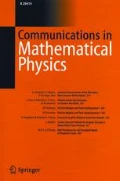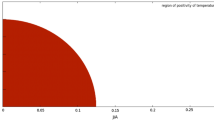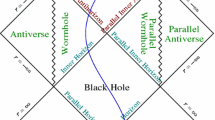Abstract
It is shown that the initial data which gives rise to stationary black hole solutions extremizes the mass for a given angular momentum and area of the horizon. The only extremum of the mass for a given area of the horizon but arbitrary angular momentum is the Schwarzschild solution. In this case, and when the angular momentum is small, the extremum of the mass is a local minimum. This suggests that the initial data for the Schwarzschild solution has a smaller mass than any other initial data with the same area of the horizon. If this is the case, there is no possibility of proving the occurrence of naked singularities by methods suggested by Penrose and Gibbons. Together with Carter's theorem, the fact that the extremum is a local minimum indicates that the Kerr solutions are stable against axisymmetric perturbations.
Similar content being viewed by others
References
Bondi, H., van der Burg, M. G. J., Metzner, A. W. K.: Proc. Roy. Soc. A269, 21 (1962)
Penrose, R.: Phys. Rev. Lett.10, 66–68 (1963)
Hawking, S. W., Hartle, J. B.: Commun. math. Phys.27, 283–290 (1972)
Hawking, S. W.: The Event Horizon in Black Holes Ed. DeWitt and DeWitt, New York, Paris, London: Gordon and Breach 1973
Hawking, S. W.: Commun. math. Phys.25, 152–166 (1972)
Hawking, S. W., Ellis, G. F. R.: The Large Scale Structure of Spacetime. London: Cambridge University Press 1973
Carter, B.: J. Math. Phys.10, 70–81 (1969)
Carter, B.: The General Theory of Stationary Black Hole States in Black Holes Ed. DeWitt and DeWitt, New York, Paris, London: Gordon and Breach 1973
Gibbons, G. W.: Commun. math. Phys.27, 87 (1972)
Choquet-Bruhat, Y., Geroch, R. P.: Commun. math. Phys.14, 329–335 (1969)
Bardeen, J. M., Carter, B., Hawking, S. W.: Commun. math. Phys.31, 161–170 (1973)
Bardeen, J. M.: Ap. J.162, 64 (1970)
Carter, B.: Phys. Rev. Lett.26, 331–332 (1971)
Chandrasekhar, S., Friedman, J. L.: Ap. J.177, 745 (1972)
Author information
Authors and Affiliations
Rights and permissions
About this article
Cite this article
Hawking, S.W. A variational principle for black holes. Commun.Math. Phys. 33, 323–334 (1973). https://doi.org/10.1007/BF01646744
Received:
Issue Date:
DOI: https://doi.org/10.1007/BF01646744




